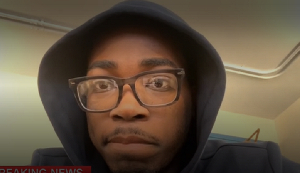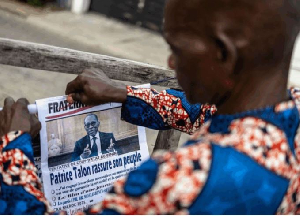By Kojo Ayidan
When MTN launched their ‘90 Cars in 90 Days’ promotion during the Ghana Music Awards Festival, the mention of GHC0.75 per text message triggered a roar of disapproval from the audience, some of whom described the promotion as “a gamble”.
For the avoidance of doubt, here are the worlds of George Andah when he launched the promotion: “Tonight MTN, in partnership with Upstream and V Mobile, outdoor the biggest consumer reward promotion to ever hit Ghana.” So the concerns were that, if indeed it is a consumer reward promotion, why the hard gamble?
Some of the comments that followed were ‘Eei, MTN is here again with another plan to make money quick from us - if they want to reward us, can’t they do it without charging GHC0.75 per text message – that is more than someone’s lunch money - why don’t they charge the normal text message rate or even make it free like Vodafone did – must we always gamble for MTN rewards?’
Those were real comments from honest MTN subscribers, who are interested in the cars but are also genuinely concerned about the fact that their network is gambling with their loyalty.
As a journalist, I found it interesting, but not surprising, that none of the media reports and commentaries, after the show, touched on the response of the audience to the launch of the ‘90 Cars in 90 Days’ promotion. I am not surprised about the deafening silence in the media over this issue because it seems to give credence to the suspicion that MTN is subtly courting the Ghanaian media, particularly some top broadcasters and journalists, who are supposed to speak for the voiceless but rather choose to speak for MTN. Some media persons are tagged MTN Partners and Ambassadors, so they do not highlight public complaints about MTN. They always talk about the problems with other utility services like water and electricity, but they hardly talk about telecom, which is probably the most indispensable utility in the world today. The problems we face with telecom networks in this country are so loud, that it a shame that the media does not talk much about it. I wonder if the Ghanaian media today is still the ‘fourth estate of the realm’ or we have been criminally integrated into other estates we are supposed to be checking. Since the launch of the ’90 Cars in 90 Day’ promotion, I have been sampling comments from both MTN and non-MTN subscribers, and the concerns raised do not stop with MTN but extend to other telecom operators, like TIGO, who are also running promotions, in which they are subtly fleecing money from their customers in a more rapid fashion than usual.
VODAFONE It is important to state, without prejudice, that a genuine customer rewards promotion by a telecom company in Ghana in recent times was the Vodafone Rewards Promotion. It saw one Vodafone customer, a carpenter from the Eastern Region, winning a prize package worth one million US dollars. That promotion is adjudged genuine because customers were not required to do anything other than buy and use their credit like they normally did. Every customer of Vodafone stood a chance of winning. In fact during the promotion, Vodafone also started dashing up to 75 per cent credit to customers to give them more chances of staying on line and winning.
According to Mr. Paul Ryan, External Affairs Director of Vodafone Ghana, as far as Vodafone is concerned, customer loyalty rewards promotions are meant to reward customers and not to make profit. Our expert sources agree with his position. They noted that it is unethical to organise customer rewards promotions with a profit motive, adding that there is no justification for making customers gamble for prizes meant to reward their loyalty.
When MTN launched the Text GO to 2010, they announced that the entire promotion for the 100-day period was worth eight million Ghana cedis. At the time MTN had 6.8 million subscribers, and according to George Andah, third party research indicated that all of MTN’s customers had active subscriptions. To qualify for entry, subscribers had to first text GO to 2010 at a cost of GHC0.50 (5,000 old cedis) per text. Normally, a text message on MTN costs GHC0.05 (500 old cedis); meaning subscribers wishing to participate in the promotion paid 10 times or a monstrous 1000% of the cost for a normal text message.
After the initial text, MTN kept sending the customer ridiculously easy questions to lure the customer to keep sending text messages until the customer decides enough of his money has been sucked away.
MATHEMATICS
Let us now look at the mathematics based on very conservative assumptions and George Andah’s own claims. Assuming each of the 6.8 million active MTN subscribers sent one text message to 2010, the company would have generated GHC3.4 million in just one day; multiply that by 100 days, it comes to GHC340 million. We can give MTN the benefit of the doubt and say probably all 6.8 million subscribers sent one text message a day for only half of the time; so dividing GHC340 million by two we get GHC170 million. For quarter of the time the returns would have been GHC85 million. Even for one/eighth of the time it comes to GHC42.5 million. Compare that with the eight million Ghana cedis total prize package MTN gave out and decide whether that promotion was indeed meant to reward customers or to suck money from them more rapidly. It will be most revealing to see the actual figures from MTN.
Besides, out of the 6.8 million customers, only a few benefited from the promotion. Meanwhile, some of the customers sent tonnes of messages each day but never won. One winner confessed that he spent as much as GHC60 (600,000 old cedis) a day before he eventually won once.
Now to the ongoing ‘MTN 90 Cars in 90 Days’ promotion; this new promotion is obviously based on the resounding success of the Text GO to 2010 promotion, but this time MTN has taken the make-money-quick tactics to another level; customers have to text WIN to 2010 at a scandalously huge cost of GHC0.75 (7,500 cedis). After one sends the initial text, one receives several absurdly easy questions to answer through text messages at the same cost per each text.
Currently, MTN has more than eight million active subscribers, so if we apply the same assumption, one text per day by each customer, multiplied by 90 days, they will be making GHC540 million for a promotion that is costing them about GHC10 million. Half of that is GHC270 million; a quarter is GHC135 million, and one/eighth is GHC67.5. The 90 cars comprise 77 Hyundai i10s and 13 Hyundai ix35s. My checks at Auto Plaza revealed that the manual version of Hyundai i10 costs $9,500 (GHC13,547.6) and the automatic version is $12,000 (GHC17,112.7); and ix35, manual cost £25,000 (GHC35,651.5) whiles the automatic cost $26,000 (GHC37,077.6). Let us assume that MTN went in for the automatic versions only. Seventy-seven i10s comes to GHC1,317,677.9 and 13 ix35s comes to GHC482,008.8. The total will be GHC1,799,686.7. The discount MTN got from the dealer for buying 90 cars has not been factored in. So the total plus the cost of the other prizes (cash, electrical appliances, MTN credits and other items), and other expenses in organising the promotion (publicity, personnel etc), may bring the total to about GHC5,000,000 tops. Compare that to GHC135 million or even GHC67.5; indecently huge profits.
DECEPTION
MTN is also adding deception to indecency; for instance, on April 24, 2010, at 17:56hours, my wife, who has never enlisted for the promo, got a message from MTN saying “Confidential info! Incidentally your name has been short-listed to win MTN’s Hyundai i10 tonight and ix35 tomorrow! Simply text WIN to 2010! 75Gp/SMS”. How did my wife get short-listed when she has not even enlisted? This is deception with an indecent profit-making motive. Besides, if the promotion is not suspect, why would MTN use the promo jingle on radio and the announcement on its website to caution customers to “participate responsibly”?
It seems the redenomination of the cedi has also played well into the hands of these money-sucking telecom operators; they are now able to get Ghanaians to throw away multiples of GHC0.50 and GHC0.75 (7,500 cedis) in single text messages in expectation of some rewards, which may never come. Remember that GHC0.75 is 1,500% of the cost of a normal text message on MTN. If the old denomination had been maintained, how many Ghanaians would have been ready to throw their lunch money, 7,500 cedis, away in just one text message for whatever reason?
TIGO AND ZAIN
But MTN is not alone; Tigo has also become very aggressive lately with similar promotions where they suck as much as GHC0.50 (5,000 cedis) per text message from customers who wish to win daily prizes and ultimately the grand prize of GHC30,000. Based on the success of the first promotion, they also launched a second one on the very day the first one closed and continued in the same fashion, GHC0.50 per text message to short code 3003. But the ultimate prize dropped to GHC20,000. Now they are doing ‘Text Goal to 2020”, another consumer fleecing promotion.
Tigo also employed deception. My mother-in-law got a message on her Tigo phone which read “Congratulations, you have won cash. Just send TIGO to 3003 to claim your prize.” After sending Tigo to 3003, my mother-in-law followed up to the headquarters of Tigo to collect her prize, only to be told she did not win. If this is not deception, I wonder what is. Zain is also running the second edition of their LIVE YOUR DREAMS promotion, in which customers are supposed to either top up with GHC2.00 voucher or spend up to GHC0.50 in a day to gain one entry into a weekly draw and win up to GHC75,000. That sounds fair, but a closer look will reveal that even though Zain is not sucking money from customers like MTN and Tigo are doing, Zain is still making customers spend at least GHC0.50 a day for one entry. In other words, unlike the Vodafone Rewards Promotion, where all the customers stood a chance of winning just by being Vodafone customers, Zain’s promotion virtually excludes customers who are not able to spend up to GHC0.50 a day from getting entered to win. It is like sales promotion, it cannot be faulted even though it is not entirely free.
SURVEY IN NIGERIA
In a survey conducted last year by the Independent Newspaper of Nigeria on the link between telecom rewards and subscriber expectation, several respondents said they preferred better network quality and rewards in the form of tariff cuts for all subscribers, to the rewards given to a few subscribers. Some subscribers suggested that operators should rather use the moneys earmarked for rewards promotions to improve network quality. Indeed, owing to poor quality service, the Nigerian Communication Commission (NCC), in September 2006, banned all promotions by the telecom operators in that country to ensure that they dealt with the network congestions before undertaking any promotions. (Source: http://allafrica.com)
Another survey conducted last year by the National Daily Newspaper, also in Nigeria, said that subscribers of Globacom, complained of spending up to 300 Niara on text messages to participate in subscriber rewards promotion, which were not rewarding for the most part. According to the report, published on the newspaper’s website, some subscribers actually accused Glo of using promotions to subtly take money from subscribers in a manner that suggested that “they are out to fleece us of our hard-earned money rather than improve our lots.” (Source:http://allfrica.com). This is similar to what the audience said when MTN launched the 90 Cars in 90 Days promotion. It is instructive to note that Glo will start operations in Ghana soon and potential subscribers need to watch out.
Even though the telecom market in Ghana is a free one, the regulator, National Communication Authority (NCA) can take a cue from the Nigerian regulator, NCC, and curtail the indecent, deceptive and unethical manner in which some operators are running promotions, particularly in the light of network challenges subscribers continue to face. It is important to ensure that those promotions are rewarding to customers rather than a rip-off to the greater majority. ENDS
Opinions of Friday, 30 April 2010
Columnist: Ayidan, Kojo














